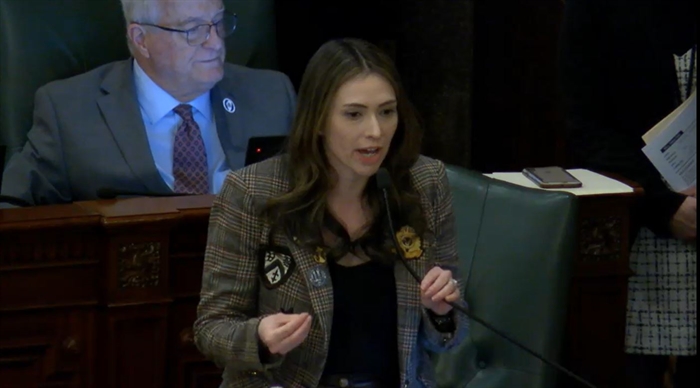House sends 41 bills to Senate as Friday legislative deadline looms

The Illinois House passed 41 bills to the Senate Tuesday ahead of a scheduled Friday deadline.
The measures, among others, included a ban on polystyrene food containers, bills focusing on gender inclusivity in state law and a requirement that expectant parents have a “duty” to split pregnancy-related costs, including for abortions.
Below are a few of the measures that passed, all of which will require Senate approval and a signature from the governor to become law.
Proposed south suburban airport
The long-debated idea of building a cargo-oriented airport and shipment center in Chicago’s south suburbs could get another look under one bill that passed the House.
House Bill 2531, by Rep. Will Davis, D-Homewood, calls on the Illinois Department of Transportation to establish a process for prequalifying entities that could offer a public-private agreement to develop such a project.
“Many people in the Southland feel that there is a developer who has the resources, the capacity and a desire to build it, and they would love to be able to respond to this document,” Davis said. “So what we’re asking is that IDOT put a document out there to see if there is a developer willing to respond.”
The bill changes a law the General Assembly passed in 2013 that gave IDOT permission to launch such a project. HB 2531 would require the agency to establish a prequalification process within six months of the bill becoming law.
The bill also expands the potential scope of the project to include not just an airport, but a “cargo-oriented development” that includes both “multimodal nodes of freight transportation and centers of employment in logistics and manufacturing.”
The idea of a south suburban airport has met opposition from some business groups and operators of the Rockford airport.
The bill passed 72-40 and now heads to the Senate.
Polystyrene container ban
A bill that would ban polystyrene disposable food containers – commonly referred to by the brand name Styrofoam – passed the House by a 67-43 vote.
After Jan. 1, 2024, House Bill 2376 would prohibit retail establishments from selling or distributing containers made of polystyrene foam.
“I think this is a reasonable measure that starts with just carry-out food containers, promotes responsible stewardship for our planet,” Rep. Jennifer Gong-Gershowitz, a Democrat from Glenview and the bill’s lead sponsor, said on the House floor.
The bill would provide temporary exemptions for certain establishments including food pantries, soup kitchens, non-profits, and federal, state, or local government agencies that provide food to “needy individuals at no or nominal charge. A ban would take effect for those entities beginning in 2025.
Sen. Laura Fine, D-Glenview, is the lead sponsor of an identical bill in the Senate.
Splitting pregnancy expenses
The House, on a 65-40 vote, approved a proposal stating that each parent in a pregnancy “has a duty” to split pregnancy-related costs. These costs include health insurance premiums, abortion services and medical costs including delivery.
House Bill 2477 provides that pregnancy-related costs must be split at least 50 percent between the pregnant person and the “other party to the pregnancy or the other intended parent,” meaning the person who contributed sperm or the person who has expressed the intent to become the child’s legal guardian. This excludes cases of sperm donation and contracted surrogacy.
Someone wishing to recover pregnancy costs would have to file a motion to that effect in civil court.
“I really want to drive home that we are talking about in some instances thousands and thousands of dollars, even when you have insurance,” said the bill’s chief sponsor, Rep. Margaret Croke, D-Chicago.
Croke said the bill is supported by the House’s Dobbs working group, which was formed last summer in the wake of the U.S. Supreme Court’s decision in Dobbs v. Jackson Women’s Health Organization which overturned Roe v. Wade.
The bill was met with opposition from Republicans including Rep. Patrick Windhorst, R-Metropolis, and Rep. Travis Weaver, R-Edwards. They took issue with the fact that the bill would require splitting the cost of abortions.
Antidiscrimination bill
A bill that would give Illinois residents the right to sue in state court for violations of federal antidiscrimination rules passed unanimously out of the House.
Under many federal programs, private companies and organizations that receive federal funding are required to abide by nondiscrimination rules. But the U.S. Supreme Court ruled in 2021 that people who are victims of such discrimination may not recover damages for the emotional distress that results from it.
Under House Bill 2248, by Rep. Kelly Cassidy, D-Chicago, violations of those federal rules would become violations of state law as well, and people could sue in state court and recover up to $4,000 in damages for each violation.
The bill had support from several disability rights organizations. There was no organized opposition.
Gender-inclusive measures
The House approved three proposals Tuesday aimed at increasing gender-inclusivity in state law.
The first bill, sponsored by Cassidy, is a follow-up to a bill from last year that will require insurance companies to cover Pap tests and prostate exams. The law currently requires that insurance companies cover Pap tests for “female insureds” and prostate exams for “male insureds.” Both types of tests are used as cancer screenings.
The measure would remove the gendered requirements, meaning insurers would have to cover Pap tests and prostate exams for all people they insure.
“It ensures that nobody is excluded from access to preventative care,” Cassidy said on the floor Tuesday.
House Bill 2850 was approved 78-32.
The House also approved a bill requiring state agencies to track the number of state employees “who identify as non-binary or gender non-conforming.”
This adds to the existing state requirement that agencies track the number of employees that are women, members of racial and ethnic minority groups, and who have physical disabilities.
House Bill 2297, the first bill sponsored by Rep. Kevin Olickal, D-Chicago, was approved 72-39.
A third measure, from Rep. Lakesia Collins, D-Chicago, removes gendered language in several state laws that relate to children. This includes swapping “he or she” for language like “children” as well as swapping the title of the “Independent Juvenile Ombudsman” for “Independent Juvenile Ombudsperson,” among other similar changes.
House Bill 1596 passed 72-37. It would be effective 60 days after becoming law.
Approximately 1.6 percent of the adult population in the U.S. identifies as transgender or non-binary, according to a 2022 survey from the Pew Research Center.
Miss Clipping Out Stories to Save for Later?
Click the Purchase Story button below to order a print of this story. We will print it for you on matte photo paper to keep forever.

